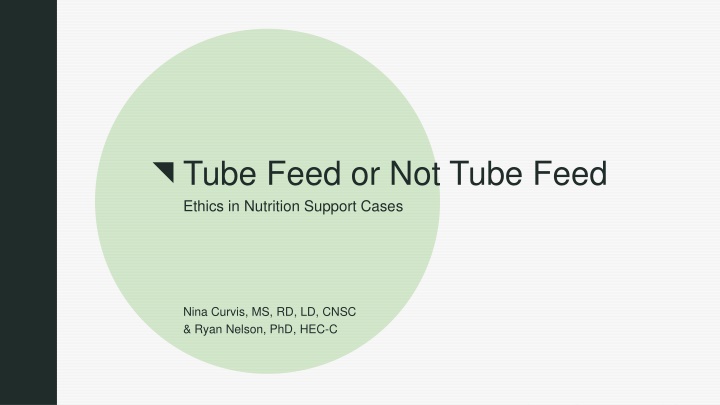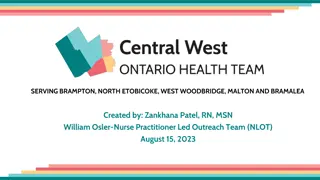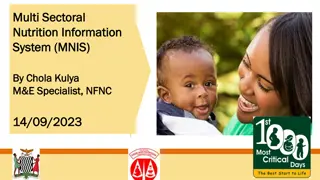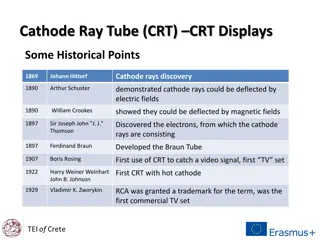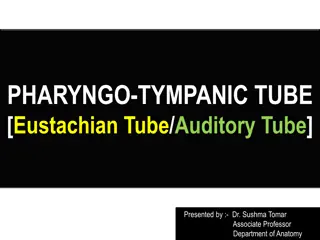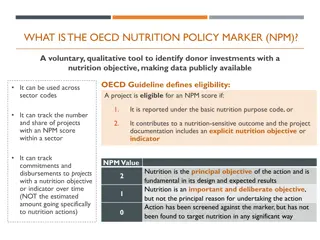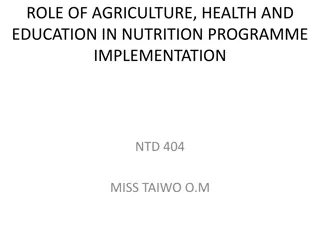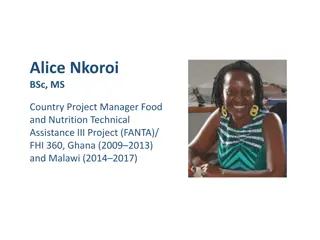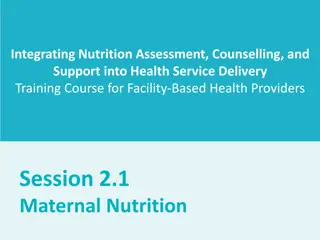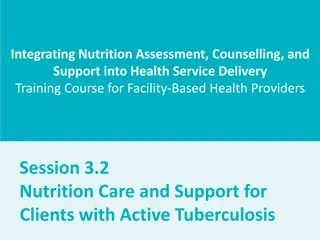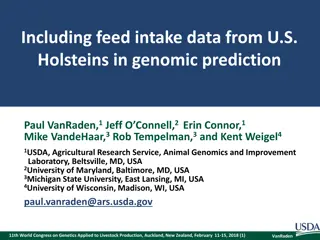Ethics in Nutrition Support: Tube Feed or Not Tube Feed
Explore the ethical principles involved in caring for patients with severe eating disorders or at the end of life in the realm of nutrition support. Learn about determining appropriate nutrition care plan options in challenging scenarios where optimal care is not feasible. Understand the importance of ethics in dietetics practice, focusing on medical ethics and clinical ethics, including the key principles of nonmaleficence, autonomy, beneficence, and justice.
Download Presentation

Please find below an Image/Link to download the presentation.
The content on the website is provided AS IS for your information and personal use only. It may not be sold, licensed, or shared on other websites without obtaining consent from the author.If you encounter any issues during the download, it is possible that the publisher has removed the file from their server.
You are allowed to download the files provided on this website for personal or commercial use, subject to the condition that they are used lawfully. All files are the property of their respective owners.
The content on the website is provided AS IS for your information and personal use only. It may not be sold, licensed, or shared on other websites without obtaining consent from the author.
E N D
Presentation Transcript
Tube Feed or Not Tube Feed Ethics in Nutrition Support Cases Nina Curvis, MS, RD, LD, CNSC & Ryan Nelson, PhD, HEC-C
Objectives Understand ethical principles involved with care of hospitalized patients with severe eating disorders, or patients at end of life. 1. Determine appropriate nutrition care plan options when optimal MNT is not available. 2. Navigate ethical challenges in providing suboptimal nutrition care when optimal care is not an option. 3.
Disclosures Nina Curvis has no conflicts of interest to disclose. Ryan Nelson has no conflicts of interest to disclose.
What is Ethics? Definition: moral principles that govern a person's behavior or the conducting of an activity Professional definition: rules that govern the actions of members of the profession The Code of Ethics for Nutrition and Dietetics Practice guides ethical practice for RDs/RDNs Applicable in all aspects of nutrition and dietetics practice We're narrowing our focus today: medical ethics/bioethics/clinical ethics
What is Clinical Ethics? Clinical ethics promotes conditions for ethical patient care Goals: Normalize and promote nuanced conversations about ethics Provide quality ethics education Guide equitable hospital policy Support patients, families, and clinicians in times of moral distress
How RDs are taught ethics... 4 principles: nonmaleficence, autonomy, beneficence, justice Code of Ethics for Nutrition and Dietetics Profession: Competence and professional development in practice (Nonmaleficence) 1. Integrity in personal and organizational behaviors and practices (Autonomy) 2. Professionalism (Beneficence) 3. Social responsibility for local, regional, national, global nutrition and well-being (Justice) 4. That's it right? Now you know exactly what ethics means in practice? ...didn't think so...
Ethics in practice How often do we think about our practice in terms of those 4 principles? Do you know these principles apply in practice? Is identifying these principles important in ethical practice? Being able to identify the 4 principles by NAME isn't important Being able to practice ethically within the framework of those principles can be helpful
Ethics Principles in MNT MNT should minimize harm to patients/clients Non-maleficence: do no harm Patients/clients have reasons for not taking our advice and we are not owed an explanation for this Respect for Autonomy: all individuals have right to govern themselves, make their own decisions about their treatment, but not demand treatment Best MNT for patient/client may go against your personal beliefs; meet people where they re at Beneficence: act in the individual s best interest Give best care to all patients/clients regardless of background, religions/beliefs, demeanor/behavior, willingness to listen or take our advice Justice: equitable distribution of resources, social responsibility for nutrition and well-being
Ethics in clinical practice Care constraints Conflicts in care goals (providers, patients, family members) Optimal care options may be unclear or unavailable Moral distress: inability take an ethically appropriate action Technology vs Ethical responsibility vs legal obligation Technology: "what can we do" Ethics: "what should we do" Legal: "what must we do" / "what must we not do"
Sub-optimal care What happens when we can t provide the best/most optimal care for a patient? Sub-optimal care Is there an optimal care option? Sometimes all care options create some measure of harm "lesser" harm may not be the "optimal" care as determined by evidence-based practice Moral distress: You know the ethically appropriate action to take, but are unable to act upon it You act in a manner contrary to your personal and/or professional values You are unable to prevent harm to a patient for reasons beyond your control
Is sub-optimal care ethical? Consider: Patient s/client s best interest Will this approach cause harm? Will the optimal care options cause more harm? What does the patient want? Would you provide this same type of care for: A patient who doesn't speak English? A patient with a disability? A patient who does not have decision-making capacity? A patient with a mental health disorder? Addiction? A patient with religious or cultural beliefs different from your own? Beliefs that you don't agree with?
The best way to practice ethics ...is to *practice* ethics! 2 cases to consider choose 1 to discuss in your group Discuss in groups of 3-4 (10 min) Regroup together, question and answers with RD and Clinical Ethicist
Case #1 Anorexia Nervosa 19 yo patient dx with anorexia nervosa 3 years ago Wt 105 lb, BMI 16.5 Residential treatment at age 17 (parents choice), gained some wt during tx Currently in hospital with bradycardia & weakness 20 lb wt loss in past 6 months Pt refuses to return to residential treatment, prefers OP therapy Pt goals: return to college, maintain current body wt/body form (no wt regain) MD would like to declare lack of decision-making capacity, would like to emergently start TF under medical necessity
Case #1 Considerations Evidence-based practice: Weight regain and nutrition repletion are recommended for patients with severe anorexia nervosa with underweight Referral to eating disorder treatment center for treatment of anorexia nervosa Legal precedent to force tube feeds in State of MN? Who decides decision-making capacity? Do you think this patient is incapacitated? Capacity: clinical determination of pt s ability to understand info, appreciate info, reason with the info, and express a choice. This is time- and decision-specific (can have capacity to make some decisions but not others; at some time but not others. This is different than competence which is a legal concept What constitutes a medical emergency/necessity for nutrition provision? Does this case meet the requirements? How do you define "harm" in this case? Is there an option that does not cause harm?
Case #2 End-stage dementia 72 yo patient, h/o advanced dementia Baseline regular diet and could self-feed with assistance from staff at NH Admitted to hospital with newly dx stroke, end-stage dementia Developed severe dysphagia and aspirated, now unsafe for PO per SLP Pt is agitated, demanding food or crying out from hunger, refusing NG tube Has advanced directive, however nothing about artificial nutrition/hydration Pt s children (from first marriage) want feeding tube placed, concerned about starving patient to death Pt s current spouse reports pt would not want a feeding tube, would like to feed PO for pleasure
Case #2 Considerations: Evidence-based practice: Experts in geriatric medicine and palliative care recommend avoiding insertion of PEG tubes in patients with advanced dementia Studies show no benefit from artificial nutrition for meaningful life prolongation, improved function, or quality of life (of note: these studies are generally observational or retrospective, not high quality) MNT for pt with severe dysphagia who failed swallow evaluation is placement of NG tube or PEG tube for nutrition support (note: pt does not meet criteria for TPN) Legal and ethical issues for withholding or withdrawing artificial nutrition/hydration Who makes decisions when patients don t have decision-making capacity? What if there is no advanced directive or patient did not previously declare a medical decision-maker? How do you define "harm" in this case? Is there an option that does not cause harm?
Questions - small group discussion (10 min) Is the proposed plan for nutrition care appropriate? Why or why not? Ethical considerations: Will the proposed plan cause harm? Is the proposed plan in the best interest of the patient? Does the proposed plan respect the patient s autonomy? How might personal bias be clouding your judgment and are you able to set it aside? How would you handle this case? What would you do as the consulting RD? Is your plan of care suboptimal ? Why or why not? What would be the optimal plan?
Large group Q&A Review of case studies: what did you decide? What questions do you have for a practicing inpatient dietitian and/or a practicing clinical ethicist? Nina Curvis, dietitian Ryan Nelson, ethicist
References AAHPM Board of Directors. (2013). Statement on Artificial Nutrition and Hydration Near the End of Life. Retrieved from American Academy of Hospice and Palliative Medicine: https://aahpm.org/positions/anh Academy of Nutrition and Dietetics. (2018). Code of Ethics for the Nutrition and Dietetics Profession. Retrieved from Academy of Nutrition and Dietetics - Eatright.org: https://www.eatrightpro.org/practice/code-of-ethics/code-of-ethics-for-the-nutrition-and-dietetics-profession Academy of Nutrition and Dietetics. (2022). Code of Ethics - Facilitator's Guide: Script for AND Code of Ethics PPT Presentation. Retrieved from Academy of Nutrition and Dietetics - Eatright.org: https://www.eatrightpro.org/-/media/files/eatrightpro/practice/code-of-ethics/ethicseducationfacilitatorsguidescript.pdf Enteral Feeding in Palliative Care: Cultural Aspects and Beyond. (2019). In Handbook of Nutrition and Diet in Palliative Care (2nd ed., pp. 115-121). CRC Press. Ethics and Law. (2017). In The ASPEN Adult Nutrition Support Core Curriculum (3rd ed., pp. 785-804). American Society for Parenteral and Enteral Nutrition. Henriksen, J., Current, N., & Nelson, S. (2023). Tube Feed or Not Tube Feed: Ethics beyond the Consult Question. The American Journal of Bioethics, 23(8), 104-107. Retrieved from https://doi.org/10.1080/15265161.2023.2217116 MN Legislature, Office of the Revisor of Statutes. (2023). Statute 524.5-309 WHO MAY BE GUARDIAN: PRIORITIES. Retrieved from 2023 MN Statutes: https://www.revisor.mn.gov/statutes/cite/524.5-309 Morley, G., Ives, J., Bradbury-Jones, C., & Irvine, F. (2019, May). What is 'moral distress'? A narrative synthesis of the literature. Nursing Ethics, 26(3), 646- 662. Retrieved from https://www.ncbi.nlm.nih.gov/pmc/articles/PMC6506903/#:~:text='Moral%20distress%20occurs%20when%3A%20You,undermines%20your%20integrity%20 and%20authenticity'. Nickoloff, S. (n.d.). Nutrition Dilemmas for Palliative Care and Hospice Patients. Retrieved from Department of Medicine, Medical College of Wisconsin: https://ocpe.mcw.edu/sites/default/files/AHN%20Great%20Lakes%20Conf-Nickoloff.pdf Oxford English Dictionary. (2024). Ethics. Retrieved from Google Dictionary: https://www.google.com/search?q=ethics+definition
